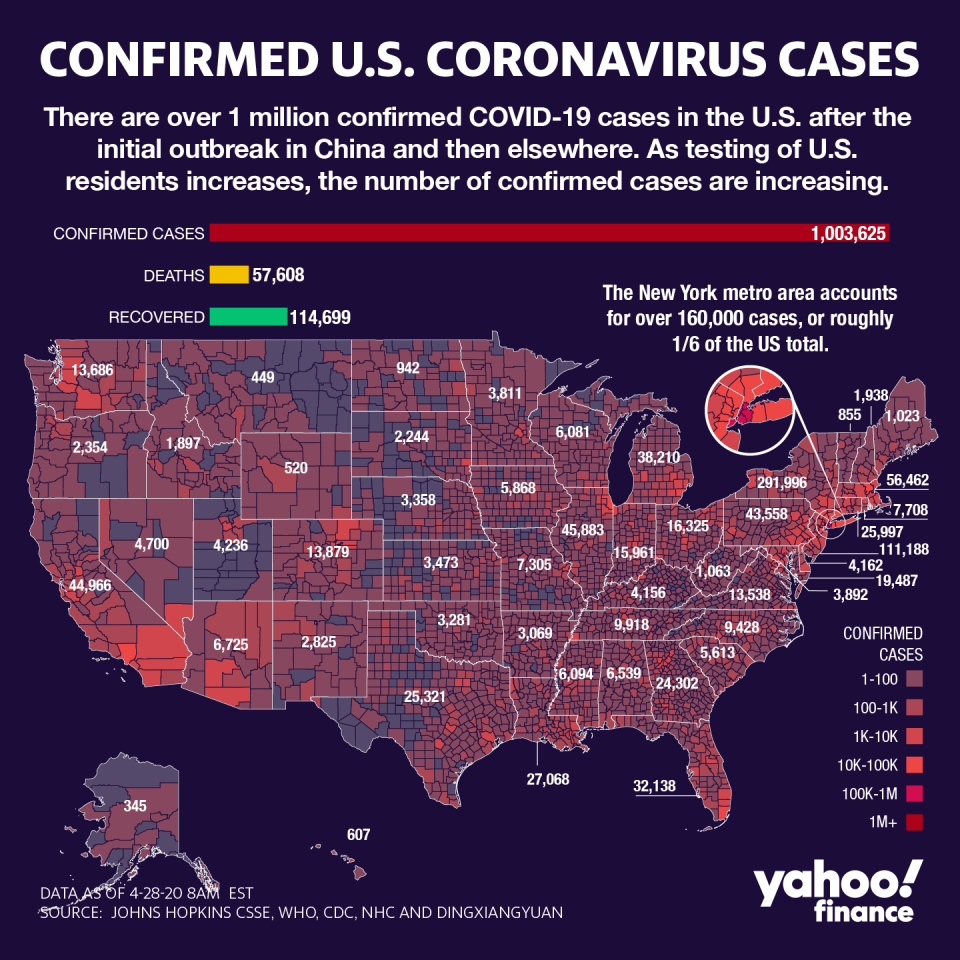Coronavirus update: US cases top 1M as reopen debate heats up, France eyes May restart
Coronavirus cases in the United States crossed 1 million on Tuesday, with a growing list of states and cities planning to relax restrictions on public movement amid persistent concerns about widely available testing.
Although the COVID-19 pandemic has showed some signs of waning in the northern hemisphere, the total number of cases are now over 3 million and has left more than 212,000 people dead. In the U.S., cases continue to grow at a slower clip than in previous weeks, led largely by slowdowns in New York's and New Jersey's infections, but more than 56,000 have died nationwide, but more than 56,000 have died nationwide.
Hopes of a gradual restart have fed a rally on Wall Street, even as the world’s largest economy faces a deep recession.
And as the U.S. struggles to come up with a uniform standard of reopening their economy, France has announced its own plans to start easing restrictions. Europe’s second-largest economy will put a focus on ramping up testing capacity to 700,000 per day, starting May 11. But the country will continue to restrict large, public events until 2021 at the earliest.
Testing is seen as pivotal to easing the agonizing lockdowns that have shut down businesses and kept the public largely indoors. While countries like Germany and South Korea have been lauded for their efforts, the U.S. is still perceived as lagging, even though private companies are moving to bolster their efforts.
Screenings are becoming more widely available, One Medical CEO Amir Dan Rubin told Yahoo Finance in an interview on Monday.
However, he cautioned that “I don't think it's going to be just about testing. It's going to be about screening, testing, and then continual screening.”
A person “can get screened and tested today, but maybe in two or three or four weeks, might show symptoms. So I'll probably want to report that to my employer on a regular basis,” the CEO added. “And that's probably not likely to be continual testing, but a kind of questionnaire-based screening and testing.”

The Empire and Garden states — the country’s hotspots — continue to see promising downward trends in hospitalizations and mortality rates that have stoked local debates on when those governments can ease their stay-at-home mandates.
“Everyone is talking about reopening. This should not be a political discussion...it is a factual discussion on reopening,” Gov. Andrew Cuomo said Tuesday. Cuomo plans to keep the state closed until May 15 at earliest, but said many areas are likely to remain shuttered for longer.
“We want to be open, but we want to do it without infecting more people or overwhelming the hospital system,” the governor added.
New Jersey, however, is experiencing a quickening of the time frame in which case rates have doubled in several counties, Gov. Phil Murphy said Tuesday, after it successfully slowed rates in much of the state.
Concerns grow over food supply
Meanwhile, President Donald Trump signed an executive order Tuesday that uses ]the Defense Production Act to order meat processing plants remain open. Those facilities are considered essential, and as such the federal government will provide guidance and personal protective gear.
Processing plant workers are one element of the pressures growing on the U.S. food supply. With many restaurants closed, consumers have flocked to grocery stores — and workers there have also been subjected to increased coronavirus exposure.
In recent weeks, the strain on plants— and as a result on livestock farms— has taken a toll on some of the meat giants. Workers have fallen ill with COVID-19, and the companies have faced a growing furor from workers and advocates demanding safer work environments as the virus spread.
Tyson, for example, was at the center of the earliest cases in one Georgia county, and has now lost four employees to the virus. The company recently issued a stark warning that “the food supply chain is breaking,” and that without government intervention farmers will have to depopulate their stock of chickens, pigs and cows.
[Click here for more of Yahoo Finance’s coronavirus coverage: Personal finance tips, news, policy, graphics & more from Yahoo Finance]
Anjalee Khemlani is a reporter at Yahoo Finance. Follow her on Twitter: @AnjKhem
Follow Yahoo Finance on Twitter, Facebook, Instagram, Flipboard, LinkedIn, and reddit.
Find live stock market quotes and the latest business and finance news.

 Yahoo Finance
Yahoo Finance 
